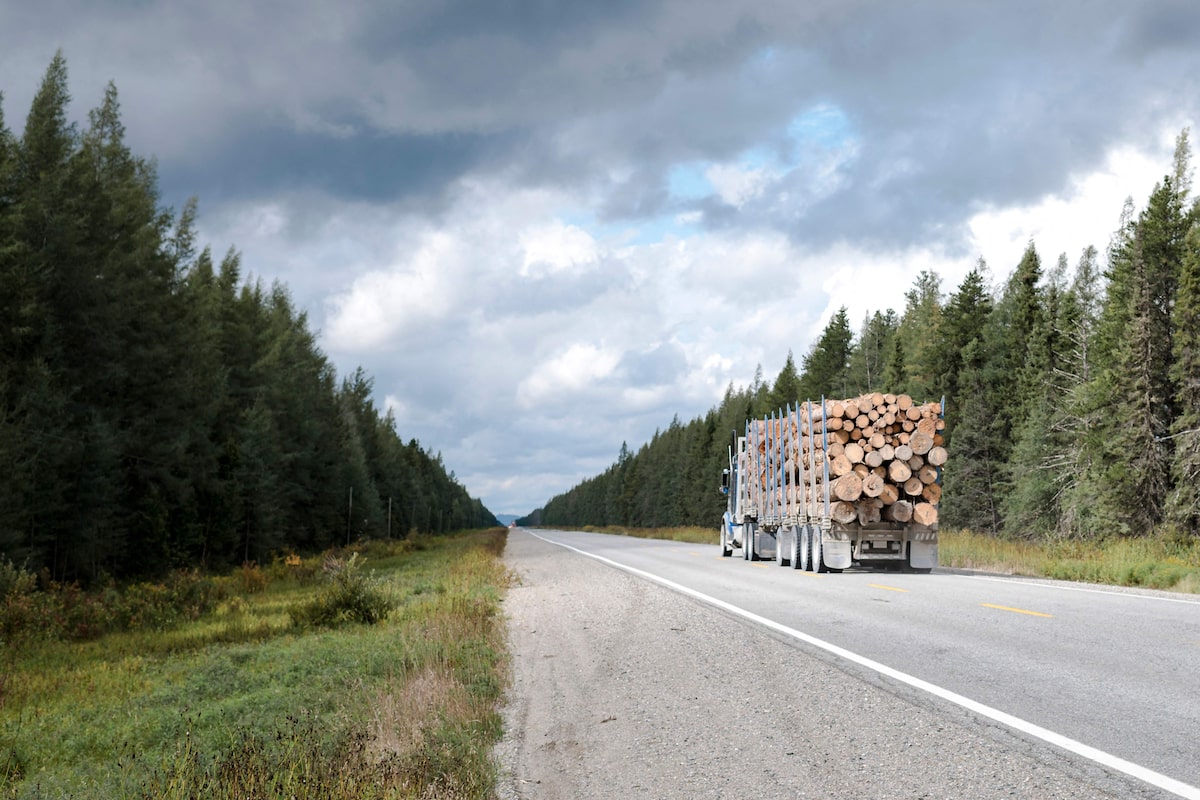A lumber truck in Seneterre, Que., on September 8, 2021. The forestry industry represents 9.6 per cent of Quebec’s exports in 2023.ANDREJ IVANOV/AFP/Getty Images
Quebec Premier François Legault is warning that 30,000 forestry jobs could be lost in the province because of Canada’s trade war with the United States, an estimate equivalent to half the work force in that industry.
His comments have set off alarm bells in various Quebec regions and logging towns, many of which have economies built on forestry. The sector represented 9.6 per cent of Quebec exports by value in 2023 as well as gross domestic product of $6.4-billion, according to provincial government data.
The Premier first stated the figure in an interview with Cogeco radio journalists in Montreal late last week, during a private meeting held to brief them about his new economic vision document, which was made public Monday. He then confirmed it to reporters in the hallways of Quebec’s legislature on Tuesday, saying “it’s a possibility” while ignoring a question on where the number came from.
“There are lots of jobs at risk in the forestry sector,” Mr. Legault said. “Of course, what we want is that Donald Trump pulls back [on tariffs] and that we’re able to diversify a part of our forest industry sales. But at the same time, we have to be realistic and look at other options.”
That includes having forestry workers retrain for mining jobs or for Hydro-Québec as part of its $200-billion development plan, he said. The utility has said it will need an average of 35,000 construction workers a year to execute the plan over the next decade, which involves tripling its wind-power production and building 5,000 kilometres of new transmission lines, among other initiatives.
Trump has his eye on Canadian forestry stocks. You should, too
Political observers have remarked in recent days on what they characterized as the clumsy way Mr. Legault stated the 30,000 figure, arguing it was a reckless pronouncement. Some local leaders in the communities affected say it’s a sign the Premier’s Coalition Avenir Québec government has given up the industry for dead as the trade turmoil continues.
The comments “hit like an earthquake,” said Yanick Baillargeon, president of the Alliance Forêt Boréale, a group representing the interests of 68 forestry communities in the Saguenay, Côte-Nord and Mauricie regions such as La Doré, Saint-Félicien and La Tuque.
“When the captain of the ship says ‘It’s done’ and tells workers ‘Don’t go into that industry,’ it sets off a panic,” Mr. Baillargeon said in an interview Wednesday. “When people don’t feel supported by their governments, by their political leaders, they see the future in a much less rosy light.”
The U.S. Department of Commerce currently levies anti-dumping and countervailing duties totalling 35.16 per cent against most Canadian softwood lumber producers after hiking the duty rates sharply this past summer.
On top of that, U.S. President Donald Trump announced new 10-per-cent tariffs on softwood in September against Canada and other countries, citing Section 232 of the U.S. Trade Expansion Act, which allows him to invoke national-security concerns to impose such levies. That means U.S. import taxes on softwood lumber now total 45.16 per cent on most Canadian producers.
Local leaders criticize Quebec Premier François Legault for appearing to give up on the forestry industry. after he announced 30,000 industry jobs could be lost to the trade war.Jacques Boissinot/The Canadian Press
There have already been casualties.
Groupe Rémabec, Quebec’s largest private forestry company, announced in June that it would shut down all forestry operations and sawmills at its Arbec manufacturing unit for an indefinite period, resulting in 1,000 immediate layoffs. It cited mounting pressure from U.S. duties and a provincial business environment it described as increasingly unstable.
In British Columbia, which has also been hit hard by the levies, Premier David Eby and Forests Minister Ravi Parmar have said the province’s lumber industry faces huge challenges, warning of devastating effects on communities and employees. Unlike Mr. Legault, however, they haven’t put a number on the potential fallout.
“Mill workers, loggers, truckers, contractors and all the jobs dependent on an active forestry industry are all under imminent threat,” Mr. Eby said in a letter last month to Prime Minister Mark Carney.
Two major Vancouver-based companies are facing different rates under the Commerce Department’s calculations. Canfor Corp. is now paying total levies of 57.59 per cent, including the additional 10-per-cent tariffs, while U.S. import taxes against West Fraser Timber Co. Ltd. now total 36.47 per cent.
“Our forest sector is facing one of its most difficult periods in decades,” Mr. Parmar said in a letter last month to Tim Hodgson, the federal Energy and Natural Resources Minister. “This situation is the direct result of the protectionist economic policies advanced by President Donald Trump.”
Earlier: Lumber industry warns of crisis as B.C. and Ottawa prepare for softwood summit
Daniel Cloutier, Quebec director of Unifor, which has nearly 15,000 unionized members in the province working at companies such as Domtar Corp., Kruger Inc. and Chantiers Chibougamau, said Mr. Legault’s suggestion that forestry workers be retrained to do mining or construction is both disappointing and far-fetched.
“What would it mean to go build a hydro dam in the north? Would it mean leaving my family? Moving my family? And what happens to the communities we leave behind?” Mr. Cloutier said. “And it’s not like the forest has tapped out. It continues to provide construction materials and other wood products that are often far less carbon-intensive than other things we use.”
In August, Mr. Carney announced plans for supporting Canada’s softwood sector. Ottawa’s $1.2-billion financial package includes $700-million in loan guarantees to help Canadian lumber producers with operations, and $500-million in grants and contributions in a bid to diversify markets and reduce dependence on the U.S.
The Business Development Bank of Canada started rolling out the loan package last month, inviting companies to apply for assistance.
